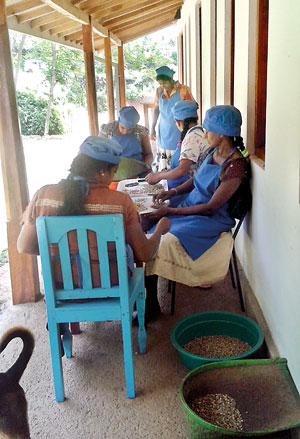A perfect cuppa from the hills of Uva
View(s):Cecily Walker visits Amba Tea Estate that specialises in a small scale production of hand-rolled tea
Located in a remote part of the Uva Highlands, even the journey to Amba Estate adds to its perfect marketing image! The last six km is a small, windy dirt road, followed by one km of concrete track and 300 metres of cobblestone. Arriving at Amba Estate, which is more like a small-scale farm in the middle of nowhere, you are offered an authentic tea experience unlike most of the large commercial plantations one drives past in this area.
But apart from the setting, what makes Amba special?
Amba Estate produces tea on a small scale, following their mantra: “Quality not quantity.” In fact the estate only produces 30 kilos of organic black tea per month, an amount which at first seems implausibly small but in fact increases their exclusivity. To put it into perspective: most commercial plantations expect their pluckers to pick a minimum of 25 kilos of tea a day but at Amba the average amount picked by all the pluckers collectively is as little as 4.9 kilos a day. Emphasis is placed on the finest quality leaf rather than the quantity.

Amba Estate: A small scale farm in the middle of nowhere
Due to their unique concept and smart marketing, Amba has conquered the high-end foreign market, supplying tea to renowned companies such as London’s Fortnum & Mason and New York’s Harney and Sons. A huge achievement was breaking into the world’s rarest tea category in Fortnum & Mason known as Tea Hunter. They currently export 10% of their tea to the legendary Fortnum & Mason guaranteeing very high prices. The concept has been so successful that they have an impending list of high-end buyers with orders adding up to 200 kilos but they are currently unable to meet that demand.
Organic is a word too often thrown around and frequently misunderstood. In Amba’s case all their tea is produced without the use of chemical fertilisers, pesticides, or other artificial chemicals and their land is certified organic by Control Union. Similarly, all their tea is processed by hand using a variation of traditional techniques. They do make some machine quality rolled tea which is distributed to the local market at a lower cost, however what sets them apart is their hand rolled tea. Because tea was introduced to Sri Lanka, India and other former colonies by the British as an “industry” all teas are rolled by machine for maximum efficiency.
Initially the idea of hand rolling Amba tea was a practical one: with their small volumes, it did not make sense to build a conventional factory so they decided to make teas by hand. Simon Bell, one of the directors explains, “It was a bit of luck – we chose to make our teas by hand because that was the only thing that makes sense for a farm of our size, but when we took the teas to Fortnum’s and other top retailers, they were so excited to find a hand-made single-estate tea from Sri Lanka.” Thus, they had stumbled upon a place for themselves in the niche market. Around 70% of teas from China and Japan are still made by hand so Amba adapted and imitated these ancient systems to create a hand rolling technique of their own. It is a highly technical and time consuming process, using the knuckles to carefully roll the leaf around the bud. It must be done slowly, requiring enormous patience in order to not break the leaf. In two hours one woman will only roll on average 750g worth of tea.
This level of precision and patience is why Neethanjana Senadheera, Amba’s Production Manager jokes that only women can do this job! He explains how the same women are employed to pick and roll the tea as the process is continuous and that way they can control quantities.

Hand-rolling: Only women can do this!
Amba is made up of four directors who all value the hard work and skill of their employees, crowning them the “superstars of the company”. Salaries at Amba are fixed and do not vary depending on weight quantities. On top of regular salaries and bonuses, 10% of revenue is shared among all workers. Unlike a regular profit-share, workers receive this benefit even when the enterprise is not making profit. This provides motivation to work hard ensuring more money for each worker. Amba directors also encourage their employees to try the tea, reducing prices in order that they can appreciate and value good tea themselves which ultimately has a positive effect on the overall flavour. These employee benefits successfully overcome the shortages of tea labourers and Amba directors urge other local companies to adopt this system in order to stop the Sri Lankan tea industry diminishing further.
Currently with a work force of 50, Amba have a waiting list of over 250 local men and women who wish to work at the business. Their on-farm value addition has increased local employment by 300% and local incomes by 400%. It’s a simple idea: keeping workers happy and valuing their skills results in a happier and more efficient working environment.
Constantly increasing demand means Amba Estate is planning on expanding to increase their production; but this has to be done cautiously in order to maintain the finest quality of tea. Being an organic business means it is hard to expand at a quick rate for two main reasons. Firstly, the land has to be carefully nurtured without the use of any fertilizers or pesticides and this process can take time. Re-planting and infilling the tea fields is a challenge in itself; in the first couple of years they lost 90% of new plantings during the drought in May-September. Now they only replant about 2 acres per year. So far they have replanted about 4 acres, and they plan to replant a further 6 over the next 3 years. But it takes 4 years before the bushes are ready to pluck.
Simon describes their second option: to persuade more local smallholders to supply Amba with fine leaf. He says “This is also a slow process – although we pay almost 10 times as much as conventional factories, smallholders are not used to plucking only 1-leaf-and-a-bud, so it takes a long time to persuade them to try this new system and to ensure that they maintain the quality we need.” The plan is to employ a full-time outgrower manager to increase the outgrower supply (and also increase Amba’s impact on the local economy). Secondly, the work is skilled and involves a high level of training and experience in order to maintain the quality. Training new employees is possible but again can be a lengthy process.
Amba Estate offers a truly unique experience of tea production in Sri Lanka. A free tour is offered every day at 11 a.m. which shows off the lovely, intimate tea estate where tea and coffee, cinnamon and lemongrass grow side by side. All production takes place in the tiny tea factory made from the former tea labourers living quarters and for R. 300 they put on an informative tea tasting in the 125-year- old colonial planter’s bungalow which is also a small guest house. The tea is exceptional and even an amateur tea drinker can tell it is made from the finest quality leaves. Be sure to purchase some from the estate itself: if you wait for a trip to London it retails at £43 (Rs. 9000) for 1.25kg!
See the Amba website http://ambaestate.com/index.php for more information on the socially responsible organic tea estate.


